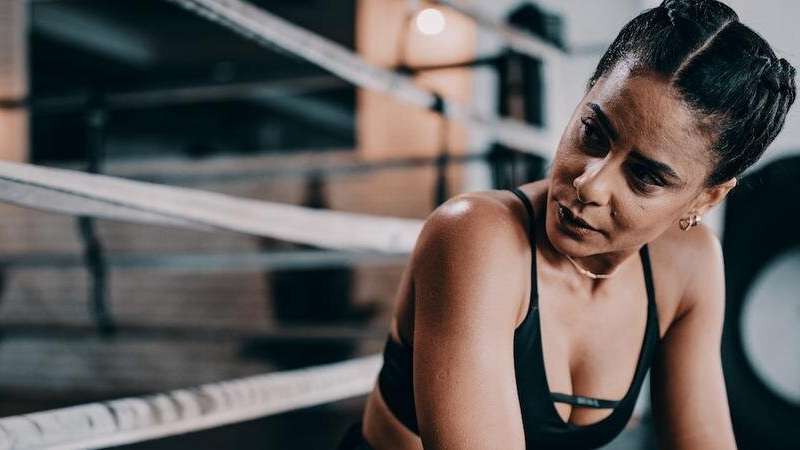
Women who compete in martial arts and combat sports challenge gender norms in their profession but often embrace them wholeheartedly and even overdo them in their personal lives, finds a UC Riverside study published in Sociology of Sport Journal.
The findings underscore the need for caution when assigning a feminist label to an organization or activity simply because it features women in powerful positions.
“Because the sport of women’s mixed martial arts, or WMMA, allows women to participate in activities that have traditionally been reserved for men, many have prematurely concluded that WMMA is actually a feminist enterprise,” said author Justen Hamilton, a doctoral candidate in sociology. “My research revealed, however, that a feminist consciousness—critical to any feminist enterprise—is sorely lacking in the sport.”
Hamilton, who has also been an MMA competitor and coach, noticed a discrepancy between how women fighters perform gender in their sport and in their personal lives. MMA is a full-contact, “no holds barred” combat sport in which athletes can use techniques adapted from a wide range of martial arts to seek victory by knockout, submission, referee intervention, or judges’ decision. Many women who were physically powerful, highly aggressive competitors seemed to be involved in personal relationships with men even stronger and more assertive than themselves.
Hamilton interviewed 40 WMMA athletes about their relationships and feelings about femininity. Almost all of the heterosexual women, the majority of his sample, said although they loved being strong and able to defend themselves, they preferred to be with a man who could protect them. They subscribed to the masculine ideal of a man who is willing to risk his own safety to protect his family. The ability to provide physical protection was the essential quality of being a man.
“I don’t wanna’ be the one that’s protecting ’cause then I’d be the one who was the masculine one,” said an interviewee.
Being smaller and weaker than a man also made the women feel more desirable. One participant said being with a man smaller than her made her feel even bigger, which made her feel fatter, less feminine, and undesirable.
Differences of size and strength are perhaps even more important to the gender and sexual dynamics of heterosexuality for these MMA fighters than they are for other straight women, according to the study. They looked for men who were taller, heavier, and even able to pick them up and carry them. Some pointed to relationships that had failed because the men felt insufficiently masculine around them, or because they felt unattracted to a man less masculine than them.
“If I could beat your ass, I’m always gonna look at you like a little brother. I’m never gonna look at you like this guy that I could potentially date,” said another interviewee. “It’s like you kinda want someone who is able to beat you up but will never do it.”
The paper states that in their MMA careers, all of the women worked tirelessly to ensure that they were bigger, stronger, and more physically capable than their opponents. In their intimate relationships, however, most of the straight women sought to be smaller, weaker, and less physically capable than their partners to combat feelings of feminine insecurity. Because of this gender insecurity, most of the heterosexual women, regardless of race or ethnicity, exclusively dated hypermasculine MMA fighters.
“I like to be able to give my partner a good run for their money, physically, but I don’t really like to win,” explained one interviewee. “Because … biologically … I think I’m just attracted to masculine men. They have to be more masculine than me because I am a woman and there is supposed to be a difference.”
Hamilton said statements such as this one stood out because they suggest these women athletes’ commitment to a hetero-feminine identity take precedent over their desire for athletic success, perhaps to their own professional and personal detriment.
“What is important to remember, however, is that these desires don’t exist in a vacuum, and they directly speak to our patriarchal system that encourages women to show deference to men,” Hamilton said.
Many of these relationships also revolved around other conventional gender norms, such as the belief that women are more nurturing and should make a comfortable and supportive home while the man provides economic and physical security. The word “alpha” came up often in interviews, with women preferring a man who would be the dominant alpha to their submissive beta.
To the handful of lesbians in Hamilton’s sample, none of these things mattered as much. In fact, the ability to protect a partner was important to some. The paper concludes that this complicated picture needs further investigation, particularly with regard to queer identities and other aspects of the women’s lives, such as friendships.
Source: Read Full Article
